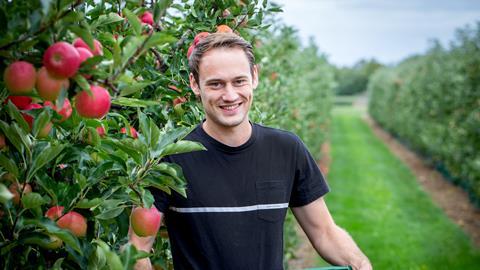As a new season brings better prices and more stable supply, members of the Landgard cooperative report strong demand for homegrown fruit
German consumers want more homegrown apples in future, according to leading fruit and vegetable cooperative Landgard.
As a result, the cooperative is working with its member growers in the country to ensure bigger and more reliable supply of the fruit.
In the western part of Germany, where Landgard has 440ha of apple orchards, the company says it has noted strong consumer demand for regional apples – especially for varieties with more crunch.
It has also advocated for long-term, sustainable prices that reflect the rising costs of production.
Philip Wißkirchen (pictured) farms 32ha of apples and four hectares of pears on his family’s third-generation orchard in Meckenheim, in North Rhine-Westphalia. He says higher prices seen for apples this year are a welcome change.
“In the past year, the prices for apples did not rise, but our costs did,” he said. “It’s good to see that our product is finally being valued again. After all, what we produce here is much more than just an apple. There is a lot of hard work, passion, and entrepreneurial risk involved in each individual fruit.”
Positive start
German apple growers have reported a positive start to the 2023 season, with good quality fruit and stable yields.
“The quality is very good and the fruit is well coloured, firm, and therefore also good for storage,” says Arthur Heinze, fruit sales manager at Landgard.
As the harvest of late-season varieties nears completion, Heinze says that growing conditions for apples in Germany have been good overall this year.
A cold spring did delay blossoms and pollination, so the season started about seven to ten days later than last year.
However, there were no extreme weather events, such as hail or extended periods of heat, which meant the crop avoided any major damage.
Only the Elstar variety, which is prone to alternate bearing, had slightly lower yields than in previous years.
Variations on a theme
For Wißkirchen, the strategy is to produce a wide variety of apple varieties, including Wellant, a relatively new variety that he says has a great taste and aroma.
The Wißkirchen family has also invested heavily in new technology to make their production more sustainable.
They have improved their hail protection, installed a modern, partially automated sorting system with water drainage, and converted their cooling facilities to run on green electricity.
They have also built two large water reservoirs to provide reliable and efficient irrigation for their crops.
“In the long run, this will pay off for the entire fruit growing industry in this region,” Wißkirchen concludes.
“What could be better for consumers than an apple from the region that is grown in an environmentally friendly and sustainable way, picked ripe, and delivered to the market in a short time?”




